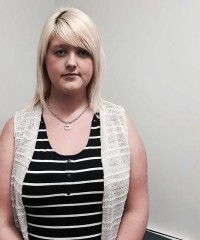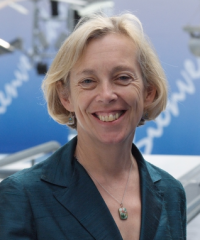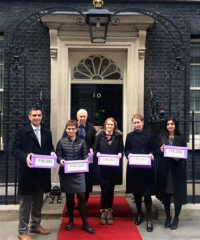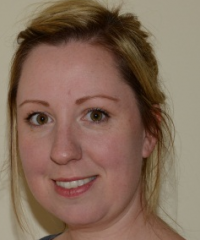
Sarah Ewart

Sarah Ewart is a Northern Irish woman who travelled to England for an abortion in 2013, having received the heartbreaking news at her 20-week scan that her baby had anencephaly and would not survive. Ewart is mounting a legal challenge to Northern Ireland’s restrictive abortion law, which prevented her from receiving the care she needed in her own country.
February
Bill to decriminalise abortion in England and Wales on Monday 13th March
Next week on 13th March, MPs will vote on a bill that would decriminalise abortion up to 24 weeks of pregnancy in England and Wales. Under a law passed in 1861 – before women could vote – any woman in the UK can face life imprisonment for ending a pregnancy without legal authorisation, including women who buy abortion pills online, many of whom are unaware they are committing a crime.
We trust women to make their own decisions about their own pregnancies. Ask your MP to do the same and protect women by supporting the bill. You can email your MP here. It takes just one minute.
Non-invasive prenatal testing concerns
We were extremely disappointed to read the Nuffield Council on Bioethics’ recent report on non-invasive prenatal testing (NIPT), and in particular by the mistrust of women that seemed to permeate. NIPT offers women more accurate screening than other methods, often earlier in the pregnancy, and – crucially – without the risk of miscarriage. Nuffield’s suggestion that NIPT could increase the risk of sex-selective abortion is deeply problematic, and we wholeheartedly reject their call to restrict women’s access to their own screening results on the grounds that they may use the information to make the ‘wrong’ decisions about their pregnancies.
Women are capable of making good, ethical reproductive choices, and – as the ones who will bear the consequences – they absolutely must be trusted to do so. Their access to information that enables them to make the choices that are right for them and their families should not be restricted. Read our full statement here.
Support for women with extreme morning sickness
New research has shown that women suffering from Hyperemesis Gravidarum (HG) are being denied effective treatment and compassionate care, leaving some with little choice but to end wanted pregnancies. A survey, conducted by Pregnancy Sickness Support (PSS) alongside researchers at Plymouth University, has revealed that women are not receiving proper information about the availability of safe and effective treatment for HG, including being misled about the dangers. Just 34% of the women interviewed felt they were given sufficient information to make an informed decision about their medication and treatment.
Bpas and PSS are calling for greater investment in day units, where women with HG can receive accurate information and specialist care from trained staff, avoiding expensive hospital stays.
Sex and Relationships Education to be taught by all England’s schools
The Education Secretary Justine Greening has announced that, from September 2019, it will be compulsory for all England’s schools to offer Sex and Relationships Education (SRE). Outdated SRE guidelines will also be improved, particularly to teach students about staying safe online. We were delighted to read the announcement, which follows months of campaigning by MPs and charities alike (including a Valentine’s Day open letter from End Violence Against Women Coalition). All young people deserve access to comprehensive SRE, which helps them to have happy, healthy relationships and improves sexual health outcomes.
Champions of Choice in the news
This month Diane Munday, former general secretary of the Abortion Law Reform Association, wrote to the Daily Mail about abortion rights and was awarded Letter of the Week. Here is her letter in full:
“Thank you for making it very clear to women who try to end their own pregnancies (even by buying safe, readily available pills) that they risk going to prison for life. This isn’t something many people know about.
“As someone who, half a century ago, campaigned for legal abortion, I knew then that the passing of the Abortion Act 1967 did much less than needed. It only made exemptions to the Victorian law still in force which makes criminals of women who attempt to end their own pregnancies.
“To me (now a very old woman), it’s almost unbelievable that in 2017 women must get the written consent of two doctors before an intolerable pregnancy can be legally ended.
“On March 13, Parliament will discuss a Bill that seeks to decriminalise abortion. It could start the ball rolling to give British women the same rights that have been available in places such as Canada for 30 years, with no ill-effects.
“If only one in ten of the women who have had a legal abortion (thought to be about one in three) was to join me in writing to her MP saying “support the bill to decriminalise abortion”, it would be difficult for Parliament to ignore us any longer.”
November
Access to emergency contraception
Emergency contraception is five times more expensive to buy in the UK than it is in France. Introduced fifteen years ago, the progestogen-only contraceptive pill is extremely safe and available in many countries straight off the shelf for prices as low as €7 (£6). In the UK, however, the same pill can cost up to £30. This high price is largely a result of the mandatory consultation with a pharmacist that women must endure before being granted access to emergency contraception (EC). Not only does this consultation drive up the price, but it is also patronising, off-putting and clinically unnecessary. It has prevented men from accessing the pill on behalf of their partners and, as the Guardian notes, there is a danger of pharmacists using “moral, rather than medical, judgement”. bpas is urging that EC is reclassified as a General Sales List drug, so that it can be available straight from the shelf, without a consultation, and at an affordable price. This month we launched the #JustSayNon campaign to highlight the shockingly high cost of EC and to call on women to reject this sexist surcharge. Watch our campaign video and click here to sign up, spread the message and Just Say Non!
Legal challenge: funding abortions for Northern Irish women
A Northern Irish woman who had to pay £900 for an abortion in England has taken her legal challenge to the Supreme Court. The woman, whose case is supported by a coalition of five reproductive rights organisations including bpas, challenged the Secretary of State for Health’s decision that the NHS should not fund abortions for Northern Irish women. Northern Ireland’s extreme abortion laws stipulate that abortion is illegal in all cases unless there is a direct threat to the mother’s life (despite public opinion to the contrary). Northern Irish women who need a termination must therefore travel to England, Scotland or Wales and pay privately for their treatment – a cost that can be up to £2000. We at bpas believe this is profoundly unjust, not least because Northern Irish women pay the same taxes as those in the rest of the UK and therefore should have access to the same healthcare services. This is a hefty financial barrier with grave implications, forcing many women to delay their abortions or even resort to unsupervised home abortions, which carry a harsh criminal penalty. As such we view the NHS restriction as a direct contravention of international human rights law. The Supreme Court is yet to hand down its decision.
USA abortion rights under threat
In the wake of Donald Trump’s election, abortion rights are under threat in the state of Ohio. The state legislature has passed a bill banning abortions from as early as six weeks into a pregnancy, at which stage many women do not even know they are pregnant. According to the bill, a doctor who terminates a pregnancy when a heartbeat is detectable – or without listening for a heartbeat – can be imprisoned for up to a year. Ohio politicians cited Trump’s election victory as their motivation to push through the bill. Pro-choice men and women in Ohio are protesting. Since being elected, Donald Trump has stayed firm on his intention to appoint pro-life justices to the Supreme Court, who could overturn Roe v. Wade, revoking women’s constitutional right to abortions in the USA. He has also appointed a Secretary of the Department of Health and Human Services, Tom Price, who supports the defunding of Planned Parenthood. We stand alongside the women in Ohio, and across the United States, who are being forced to defend their rights to legal abortion access and reproductive choice.
New statistics on motherhood
New figures published by the Office of National Statistics suggest that women are opting to have fewer children. The proportion of women who reach the end of their childbearing years with only one child has increased to 18%, which, for the first time in decades, is higher than the proportion of women who have three children (17%). Two-child families remain the most common (37%). The figures also show that the number of teenage pregnancies continues to decline, whilst the proportion of 35-year-old women who bear children has increased (from 30 births per 1000 women in 1978 to 75 births per 1000 women in 2005). This is consistent with the NHS’s most recent report on Hospital Maternity Activity, which notes both that the proportion of caesarean sections increases with age, and that there have been more caesarean deliveries in recent years. At bpas we do not see this as a problem, but rather we respect and support women’s family planning decisions, and trust them to choose both when and how many children to have, depending on what is right for them.
New support for decriminalisation
The Women’s Equality Party has passed a motion at its inaugural party conference to decriminalise abortion, voicing its support for the We Trust Women campaign. In a welcome statement, the party’s leader Sophie Walker has described the limiting of reproductive rights as “a form of violence against women”, calling for abortion to be decriminalised and treated instead as a sexual health and human rights issue. The WEP’s campaign comes in the same month as an announcement that Labour MP Diana Johnson has tabled a 10-minute bill for March 2017 to decriminalise abortion, and amid new calls for the Scottish government to decriminalise terminations now that abortion law has been devolved. Sign up here to join our We Trust Women campaign to decriminalise abortion across the UK.
Champions of Choice in the news
Two of our Champions of Choice, Susan Seenan (chief executive of Infertility Network UK and co-chair of Fertility Fairness) and Sarah Norcross (co-chair of Fertility Fairness), have raised concern following the news that Britain’s fertility services are failing to meet national guidelines, with only two per cent of clinical commissioning groups funding all the fertility treatments recommended by the National Institute for Health and Care Excellence (NICE). Speaking to the Telegraph, Seenan described this as, “cruel and unethical, and a national disgrace for the country that pioneered IVF”. Norcross added, “The IVF postcode lottery is being exacerbated by CCGs not making evidence-based commissioning decisions and routinely ignoring the guidance from the National Institute of Health and Clinical Excellence”.
bpas chief executive Ann Furedi has written an important piece in the Telegraph to expose the deep flaws in Donald Trump’s pledge to give abortion law “back to the states”. She outlines the dangers that will face women if they do not have access to safe and legal terminations in their own state: “Do not underestimate how great these distances are and how difficult travel can be… Wealthy women with problem pregnancies will get on planes; poor women will have to cope in whatever way they can. Already US researchers report an increased unregulated use of medications obtained online”. You can read her full article here.
Champion of Choice nomination
For this month’s Champion of Choice we nominate First Minister of Scotland Nicola Sturgeon, who has confirmed her intention to hold talks with the Scottish NHS to explore the provision of free abortions in Scotland for Northern Irish women. Sturgeon has consistently defended women’s access to safe and legal abortion care, resisting calls for the 24-week limit to be reduced. Her comments were welcomed by Amnesty International’s Patrick Corrigan who said, “Given the utter human rights failure of Northern Ireland’s Ministers to provide free, safe and legal abortion healthcare for women and girls here, we welcome the commitment of Scotland’s First Minister to explore what can be done via NHS Scotland.” We believe that Sturgeon’s commitment to providing NI women with free abortion care in Scotland makes her a worthy and vital champion of choice. We applaud her intervention and hope that England and Wales might follow her example.
Cathy Warwick

Professor Cathy Warwick CBE is Chief Executive of the Royal College of Midwives, and works to promote women-centred care and informed choice in all aspects of reproductive health. From improving perinatal mental health services to addressing the shortage of midwives in the NHS, Cathy has put maternity care firmly on the political agenda, and acts as a vocal advocate for pregnant women’s right to individualised, respectful care. Read Cathy’s piece about how important choice is in maternity care here.
Dr Ellie Cannon

A GP and broadcaster who regularly tackles misinformation masquerading as science, Ellie has also authored Keep Calm: The New Mum’s Manual. In a society swarming with confusing, conflicting advice which fills mothers with guilt and fear of “getting it wrong”, Ellie encourages women to trust their own instincts and make the choices that are right for them and their family.
Erika Garratt

A passionate advocate for women’s right to abortion care, Erika has been at the forefront of the campaign for clinic buffer zones. Erika started a change.org petition in October 2014 after seeing video footage of a pregnant woman confronting anti-abortion protesters, which became an extraordinary success. The petition gained over 120,000 signatures in a matter of months and was critical in raising awareness of the issue with the general public. Erika presented the petition to 10 Downing Street with other members of the Back Off coalition in March 2015, and is continuing to fight the government’s inaction on this issue. Read Erika’s piece on why we need buffer zones to protect a women’s right to choose here.
Caitlin Dean

Caitlin Dean is a registered Nurse and chair person for the charity Pregnancy Sickness Support. Caitlin suffered Hyperemesis Gravidarum (HG), severe pregnancy sickness, during her three pregnancies and campaigns tirelessly to improve care, raise awareness and tackle stigma around the condition. She is passionate about ensuring women have access to evidence based information and effective treatment for the condition, writes the popular Spewing Mummy blog, is the co-author of Hyperemesis Gravidarum – The Definitive Guide and has just released her children’s book How to be an HG Hero. Read Caitlin’s piece about the proper support women suffering from HG need here.
